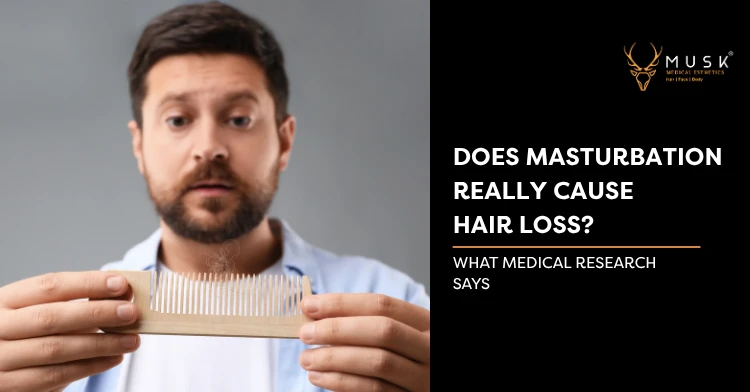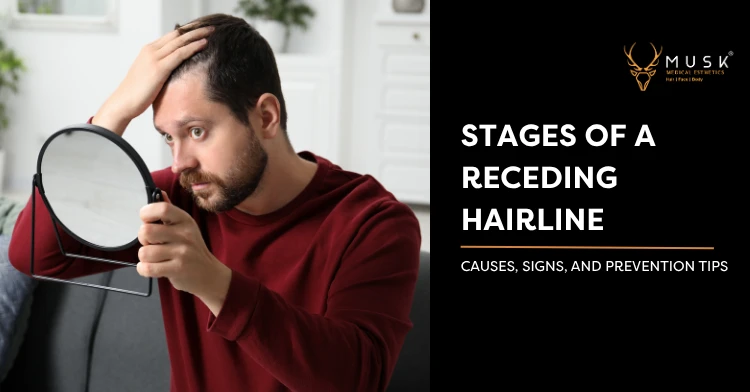Does Masturbation Really Cause Hair Loss? What Medical Research Says

You're in the shower. You look down. More hair than usual is swirling down the drain.
Panic sets in. Your mind races. "Have I been masturbating too much?"
You're not alone. Millions of men (and women) have Googled this exact question at 2 AM. The internet is full of conflicting answers. Some forums say yes. Some say no. Your friend's cousin swears it's true.
So, what's the real answer?
Let's look at what actual medical research says. And let's put this centuries-old myth to rest once and for all.
No, masturbation does not cause hair loss. This is a myth with no scientific proof. Hair loss is primarily caused by genetics, hormones, and aging—not sexual activity.
If you've noticed your hairline receding or thinning hair, you're not alone in wondering about the connection between masturbation and hair loss.
This question has plagued men (and some women) for generations, creating unnecessary anxiety around a perfectly normal activity.
At Musk Clinic, we've heard every hair loss concern imaginable. Today, we're giving you the complete, science-backed truth about masturbation and hair loss.
What's the Connection Between Masturbation and Hair Fall?
There is zero scientific evidence linking masturbation to hair loss. None. Yet this myth persists in 2025, causing unnecessary worry for millions of people experiencing natural hair thinning.
The reality? Your sexual habits—whether frequent or infrequent—have no impact on your hair follicles or hair growth cycle. Hair loss occurs due to a complex interplay of genetics, hormonal changes, and environmental factors, but masturbation isn't one of them.
Think about it logically: if ejaculation caused hair loss, people who have regular sex would also be going bald at alarming rates. But there's no correlation between sexual activity and pattern baldness in medical literature.
Where Did This Myth Come From? The Historical Origins
The belief that masturbation causes hair loss isn't new—it dates back centuries to a time when masturbation was considered sinful and harmful.
In the 1700s and 1800s, Swiss physician Samuel-Auguste Tissot wrote extensively about the supposed dangers of masturbation, claiming it caused everything from blindness to hair loss. His 1760 treatise "Onanism: Dissertation on Diseases Produced by Masturbation" spread fear across Europe.
In 1830, a French book called "Le Livre Sans Titre" featured graphic illustrations showing men losing their hair after masturbating, with captions warning that "his beautiful hair falls out as in old age."
These outdated beliefs were rooted in moral panic rather than medical science. Modern research has completely debunked these claims, yet the myth stubbornly persists in online forums and whispered conversations.
The Three Main Theories Behind the Masturbation-Hair Loss Myth
Let's examine the three most common theories people cite when claiming masturbation causes hair loss—and why each one falls apart under scientific scrutiny.
Theory 1: Masturbation Increases DHT Production
The Claim: Masturbation raises testosterone levels, which converts to DHT (dihydrotestosterone)—the hormone responsible for male pattern baldness.
The Reality: While masturbation may cause a temporary, short-lived spike in testosterone, this increase is minimal and returns to baseline within minutes. This brief fluctuation isn't enough to meaningfully impact DHT levels.
Here's what research shows: A 2001 study found that testosterone levels actually increased after men abstained from masturbation for three weeks. If higher testosterone from not masturbating leads to more DHT, then logically, avoiding masturbation should cause more hair loss—not less.
DHT is produced when the enzyme 5-alpha-reductase converts testosterone into DHT. This process is primarily influenced by your genetics and age, not your sexual activity. Some people are genetically predisposed to have hair follicles that are sensitive to DHT, leading to androgenetic alopecia (pattern baldness).
The math doesn't add up: If ejaculation caused DHT-related hair loss, regular sexual intercourse would also cause baldness. But there's no evidence linking sex to hair loss either.
Theory 2: Masturbation Depletes Body Protein
The Claim: Semen contains protein, so frequent ejaculation depletes the body's protein reserves needed for hair growth.
The Reality: Let's look at the actual numbers. Semen contains approximately 20-60 mg of protein per milliliter. During a typical ejaculation, a man releases about 3.7-5 ml of semen.
At maximum protein content (60 mg/ml), this equals just 300 mg of protein per ejaculation.
Compare this to daily protein requirements: Men should consume approximately 55-56 grams of protein per day on average. That's 55,000 mg—more than 180 times the amount lost during ejaculation.
Even if someone masturbated four or five times daily (highly unusual), they'd lose just over 1 gram of protein. This is easily replenished by eating a single egg, a glass of milk, or a handful of nuts.
Your body contains thousands of grams of protein. The tiny amount in semen is insignificant and has no impact on hair follicle nutrition or protein availability for hair growth.
Theory 3: Masturbation Disrupts Hormonal Balance
The Claim: Frequent masturbation creates hormonal imbalances that trigger hair loss.
The Reality: While masturbation does trigger the release of certain hormones like oxytocin (the "pleasure hormone"), these changes are temporary and localized. They don't create lasting hormonal imbalances.
Your endocrine system is incredibly resilient and well-regulated. The hormonal fluctuations from sexual activity are normal, temporary, and part of healthy bodily function. They don't disrupt the hormonal balance enough to affect hair follicle health or trigger hair loss.
Research shows no permanent hormonal changes occur from regular masturbation that would contribute to androgenetic alopecia or any other form of hair loss.
What Causes Hair Loss?
If masturbation doesn't cause hair loss, what does? Understanding the real culprits helps you address the issue effectively.
1. Genetics and Male Pattern Baldness
Androgenetic alopecia (male or female pattern baldness) is the most common cause of hair loss, affecting over 50% of men by age 50 and millions of women worldwide.
This hereditary condition occurs when hair follicles are genetically sensitive to DHT. The DHT hormone binds to receptors in hair follicles, causing them to shrink (miniaturize) over time. This results in progressively thinner, shorter hair until the follicles eventually stop producing visible hair.
This genetic predisposition can be inherited from either parent's side of the family. If your father, grandfather, or maternal relatives experienced pattern baldness, you're at higher risk.
Explore advanced solutions: Learn about Hair Transplant in Ahmedabad at Musk Clinic.
2. Hormonal Changes
Hormonal fluctuations from thyroid disorders, pregnancy, menopause, or PCOS (polycystic ovary syndrome) can trigger temporary or permanent hair loss. These medical conditions affect hormone levels far more significantly than sexual activity ever could.
3. Nutritional Deficiencies
Your hair needs specific nutrients to grow and thrive. Deficiencies in:
- Iron (especially common in women)
- Biotin (Vitamin B7)
- Vitamin D
- Zinc
- Protein
can all contribute to hair thinning and shedding. While semen contains protein, dietary protein is the actual concern—not what you lose through ejaculation.
4. Stress and Telogen Effluvium
Severe physical or emotional stress can push large numbers of hair follicles into the resting phase (telogen phase), causing sudden, diffuse hair shedding 2-3 months after the stressful event. This condition, called telogen effluvium, is temporary but can be alarming.
5. Medical Conditions
Several health conditions can cause hair loss:
- Iron (especially common in women)
- Alopecia areata (autoimmune hair loss)
- Scalp infections (fungal or bacterial)
- Anemia
- Autoimmune diseases
- Thyroid disorders
6. Medications and Treatments
Certain medications have hair loss as a side effect, including:
- Chemotherapy drugs
- Blood thinners
- Beta-blockers
- Retinoids
- Some antidepressants
7. Hair Care Practices
Excessive use of heat styling tools, tight hairstyles (traction alopecia), chemical treatments, and harsh hair products can damage hair and cause breakage or loss over time.
Does Masturbation Cause Hair Fall in Men?
No, there is zero scientific evidence that masturbation causes hair fall in men. Male hair loss typically manifests as:
- A receding hairline at the temples
- Thinning at the crown
- A gradual widening of the part line
- Progressive balding following the Norwood-Hamilton scale
These patterns are characteristic of androgenetic alopecia—driven by genetics and DHT sensitivity, not sexual behavior.
Men experiencing hair loss should look at their family history, stress levels, diet, sleep quality, and overall health rather than worrying about how often they masturbate.
Does Masturbation Cause Hair Fall in Women?
No, masturbation does not cause hair fall in women either. Female hair loss presents differently than male pattern baldness, typically showing as:
- Diffuse thinning across the entire scalp
- Widening of the center hair part
- Reduced ponytail thickness
- Rarely complete baldness
Common causes of hair loss in women include:
- Hormonal changes from pregnancy, menopause, or PCOS
- Iron deficiency and anemia (very common)
- Thyroid dysfunction
- Severe stress (telogen effluvium)
- Tight hairstyles causing traction alopecia
- Nutritional deficiencies
- Autoimmune conditions
Women experiencing unexpected hair loss should consult with a hair restoration specialist for proper diagnosis and treatment, rather than worrying about unrelated lifestyle factors.
Masturbation Myth vs. Reality: Quick Reference Table
| Common Concern | Scientific Reality |
|---|---|
| Protein loss from ejaculation | Negligible amount (300mg) easily replaced by diet |
| Increased DHT from masturbation | DHT is determined by genetics and age, not sexual activity |
| Hormonal imbalance | No permanent hormonal changes occur from masturbation |
| Hair shedding after masturbation | Pure coincidence, not causation |
| Frequency matters | Even frequent masturbation has no impact on hair health |
The Surprising Benefits of Masturbation
While masturbation doesn't help hair growth, it does offer legitimate health benefits that may indirectly support overall wellness:
1. Stress Reduction
Masturbation triggers the release of endorphins and oxytocin, natural stress-relievers. Since chronic stress can contribute to hair loss (telogen effluvium), managing stress through healthy outlets is beneficial.2. Better Sleep
Orgasm releases prolactin, a hormone associated with feelings of relaxation and drowsiness. Quality sleep is essential for overall health and supports the body's natural healing processes, including hair growth cycles.3. Mood Enhancement
The release of dopamine and endorphins during sexual pleasure improves mood and reduces anxiety. Good mental health supports better self-care habits, including proper nutrition and stress management.4. Immune System Support
Some research suggests regular sexual activity (including masturbation) may slightly boost immune function by increasing certain antibodies.Other Common Masturbation Myths Debunked
Other Common Masturbation Myths Debunked The hair loss myth isn't the only false claim about masturbation. Here are other debunked myths:
- Causes blindness – Completely false
- Leads to infertility – No evidence
- Stunts growth – Myth with no scientific basis
- Weakens muscles – Not supported by research
- Causes acne – No proven connection
- Depletes energy permanently – Temporary fatigue at most
- Causes mental illness – False and harmful claim
- Affects beard growth – No correlation whatsoever
If you're experiencing any health concerns, they're likely due to other factors requiring medical attention, not masturbation.
Does Excessive Masturbation Cause Hair Loss?
This is a common follow-up question. Many people worry that while occasional masturbation might be harmless, "excessive" activity could be different. Let's clear this up: even frequent or excessive masturbation does not cause hair loss.
The scientific reasons remain the same, no matter the frequency. Your hair loss is not determined by how often you masturbate. It is determined by your genetics and hormones, which are long-term biological factors.
Think of it this way: the tiny amount of protein and nutrients lost during ejaculation is insignificant. Your body is designed to easily and quickly replenish these. Even with daily activity, a balanced diet provides more than enough resources to keep your body and hair follicles healthy.
The myth is based on guilt and misinformation, not medical fact. If you are experiencing hair loss, focusing on frequency will only distract from the real causes. The key is to look at proven factors like family history, stress, and health, not your personal habits.
Does Masturbation Affect Facial Hair Growth?
Just as it doesn't cause hair loss, masturbation has no effect on facial hair growth. It will not make your beard grow thicker, nor will it make it thinner. The process of growing facial hair is governed by completely different factors.
Your beard growth is primarily determined by two things: genetics and hormones, specifically androgens like testosterone and DHT. These hormones signal the hair follicles on your face to produce thicker, darker beard hair, a process that starts during puberty.
While sexual arousal can cause a very slight and temporary increase in testosterone levels, this change is far too small and short-lived to impact your beard. It doesn't provide a big enough boost to stimulate new growth or a significant enough change to hinder existing growth.
Ultimately, your potential for a full beard is written in your DNA. Factors like your age and overall health play a role, but masturbation is not part of the equation for beard growth.
Real Solutions for Hair Loss at Musk Clinic
If you're experiencing hair loss, focusing on evidence-based treatments will yield far better results than worrying about masturbation.
At Musk Clinic, we offer cutting-edge hair restoration solutions backed by science:
ARTAS 9X Robotic Hair Transplant
Musk Clinic was the first in India to introduce the ARTAS 9X Robotic Hair Transplant system. This advanced technology offers:
- 99% precision in graft harvesting using AI
- Minimal scarring compared to traditional methods
- Natural-looking results with intelligent follicle placement
- Faster recovery with less discomfort
The ARTAS system is perfect for patients seeking the most advanced, precise hair restoration available today.
PRP (Platelet-Rich Plasma) Therapy
This FDA-approved, non-surgical treatment uses your own blood platelets to stimulate hair follicles and promote natural hair regrowth. PRP therapy is ideal for:
- Early-stage hair thinning
- Enhancing hair transplant results
- Treating diffuse hair loss
- Strengthening existing hair
Discover: PRP Hair Treatment benefits and process.
FUE and FUT Hair Transplant
For patients preferring traditional proven methods:
- FUE (Follicular Unit Extraction): Minimally invasive, leaves tiny dot scars, faster healing
- FUT (Follicular Unit Transplantation): Cost-effective for large graft numbers, single linear scar
Both techniques are performed by our lead surgeon, Dr. Anand B. Shah, a board-certified Maxillofacial and Craniofacial surgeon with extensive international training.
Medical Hair Loss Treatments
Non-surgical options include:
- Minoxidil (topical solution to promote growth)
- Finasteride (oral medication blocking DHT)
- Low-Level Laser Therapy (LLLT)
- Hair mesotherapy with growth factors
- Scalp micropigmentation
When Should You Worry About Hair Loss?
Some hair shedding is completely normal—we lose 50-100 hairs daily as part of the natural growth cycle. However, consult a hair specialist if you notice:
- Sudden, excessive hair shedding
- Visible bald patches or thinning areas
- Receding hairline or widening part
- Family history of early hair loss
- Hair loss accompanied by other symptoms (fatigue, weight changes, skin issues)
Early intervention produces the best outcomes. The sooner you address pattern baldness or other hair loss conditions, the more hair you can preserve and restore.
Final Thoughts: Stop Worrying, Start Treating
Does masturbation cause hair loss? The answer is a resounding no. This myth has persisted for centuries despite complete lack of scientific evidence. Your sexual habits—whether frequent or infrequent—have zero impact on your hair follicles or hair growth.
If you're experiencing hair loss, the cause lies elsewhere: genetics, hormonal changes, nutritional deficiencies, stress, medical conditions, or aging. These are the factors worth investigating with a qualified hair restoration specialist.
At Musk Clinic in Ahmedabad, we've helped thousands of patients restore their hair and confidence using proven, science-backed treatments. From cutting-edge ARTAS 9X robotic hair transplants to non-surgical options like PRP therapy, we offer comprehensive solutions tailored to your unique needs.
Don't let myths and misinformation keep you from seeking effective treatment. Hair loss is a medical condition with real solutions—but masturbation isn't the problem, and avoiding it isn't the solution.
Ready to take control of your hair health? Schedule your consultation with Dr. Anand Shah at Musk Clinic today and discover personalized treatments that actually work.
Visit us at: 7/8, Ground Floor, Shangrila Arcade, Shyamal Crossroads, Satellite, Ahmedabad, Gujarat 380015
Call for consultation: Book Now
Explore our services: Musk Clinic










